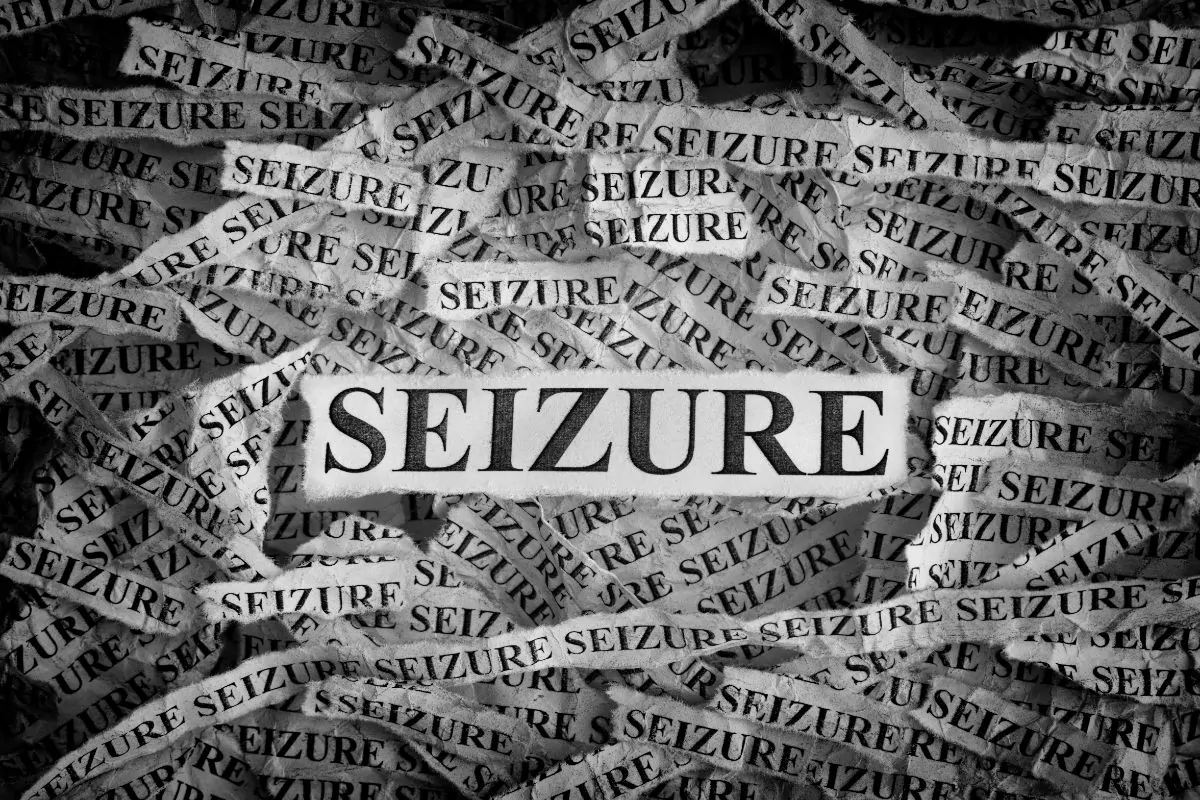How do I know if my Dog is Poisoned?
As a dog owner, it is essential to know what toxins can cause seizures in dogs and learn how to recognize the signs your dog has been poisoned to ensure that you can keep your dog as happy and safe as possible at all times!
One of the most common early dog toxicity symptoms is drooling and behavior change. You know your dog better than anyone. Is it acting strangely after having eaten something it shouldn’t? It might be time to give your vet a call!

Causes of Seizures in Dogs
You may be wondering now, what causes seizures in dogs? Seizures in dogs can happen for several reasons. First, not all episodes are because of toxins that cause seizures in dogs.
If your dog, who’s otherwise healthy, suddenly has a seizure, it is essential to find out the reason. Finding the cause of the attack will first require a neurological exam by a veterinarian and an internal-medicine workup. Your vet can run exams and tests to determine whether the seizure falls into one of three main categories for dog seizures.
- Idiopathic seizures: These are seizures with no identifiable cause. Often dogs with epilepsy fall into this category, where you know that they have had and can have seizures in the future, but you can’t determine what episode triggers the dog has.
- Symptomatic seizures: In this case, what causes seizures in dogs is that they have a structural change within the brain. It can be congenital (something they are born with), an inflammation in the brain, trauma to the head, a stroke, or a tumor growing in the brain.
- Reactive seizures: Are caused by toxins that cause seizures in dogs or a metabolic disorder within the dog. The body is “reacting” to toxins or something occurring within the body otherwise, such as a high fever or hyperglycemic (increased blood sugar).
Although toxins that cause seizures in dogs are not the most common reason for seizures, several thousand cases of poisoning in dogs are still admitted to veterinary hospitals worldwide every year. Therefore, it is essential to know what toxins can cause seizures in dogs, especially which one of them you have in your home or are likely to encounter daily!
What Toxins Can Cause Seizures in Dogs?
Most dog owners know that a common origin of dog poison is chocolate. But did you know that there are many more things in their life that can serve as dog seizure triggers?
Medication and Drugs
The medication we humans take is not suitable for our dogs; some can even cause poisons in dogs. Some of the most common medications that poison dogs are:
- Ibuprofen and aspirin (a type of anti-inflammatory painkiller).
- Ivermectin (an anti-parasitic medicines).
- Beta-blockers (heart medication).
- Antihistamines with chlorpheniramine.
- Antidepressants.
Some (more or less, depending on your location) illicit drugs that can cause dog toxicity symptoms are also:
- Cocaine.
- Amphetamines.
- Cannabis.
Remember to be honest with your vet if your dog may have ingested any of these drugs. The vets are there to help your dog first and foremost.
House-Hold Products
Some of the products we use in the house and garden can be dog seizure triggers, as they can also be quite toxic to humans if ingested. These include rat poisoning and other insecticides (products designed to kill insects). If you have issues with rats and insects, make sure to keep your dog away from the areas as well!
Food
Although we all love a good brownie, some quite common food can cause poisoning symptoms in dogs. We could easily make a list of “20 things not to feed your dog”, but what food toxins can cause seizures in dogs?
Some of the most common food objects that may be dog seizure triggers are:
- Xylitol (an artificial sweetener found in gum and sugar-free foods).
- Caffeine (found in coffee, tea, and some sodas).
- Ethanol (found in alcohol and some objects like nose spray).
- Theobromine (the toxin found in dark chocolate).
Remember that this list is only some of the most common causes of dog poisoning and only summarizes what toxins can cause seizures in dogs. If you suspect your dog may have eaten something toxic, it is crucial to seek veterinary care as soon as possible.
Dog Toxicity Symptoms
If your dog has ingested something poisonous, it may start displaying symptoms long before the seizures occur. Some dogs may begin by drooling, vomiting, whining, or just seeming “not like themselves.” They may even seem anxious, unsteady, dazed, or confused. If left untreated, this stage may turn into a total seizure.
The most common symptoms of a dog having a seizure are:
- Collapsing.
- Muscle twitching.
- Jerking body movements.
- Stiffening.
- Loss of consciousness.
- Defecating or urinating involuntarily.
These are mostly related to what is also known as “grand mal seizures,” where the whole body is involved, a loss of consciousness, and very violent muscle contractions.
Not all seizures are like this. Minor or focal seizures can only affect a small part of the body. So keep an eye out for small changes in your dog’s behavior as well.
*Side note: Some dogs may seem to “chatter their teeth,” and it may be mistaken as a focal seizure. It can be a seizure, but moving their jaw up and down fast can also be one of the subtle ways of de-stressing we sometimes see dogs do. A bit like shaking their whole body when excited!

What to do When Your Doggo Shows Dog Poisoning Symptoms
Most of us don’t have eyes on our dogs 24/7. Sometimes they are in the garden on their own, or you have gone for a five-minute shower. So you may be wondering, “how do I know if my dog has been poisoned?”. There are luckily some dog poisoning symptoms to look out for!
If your dog shows any signs of having been poisoned, or you just know that they’ve eaten something they shouldn’t have, it is time to call your emergency care veterinarian. On the other hand, if you aren’t sure what your dog may have ingested, it is time to go hunting around the house.
Look for wrappers, broken containers, or stains around your home. Maybe the bin has been turned over!
There are almost always signs that your dog has been up to something shady somewhere in your house. If you can’t find any reason at all your dog may be feeling ill, then your vet will more than likely recommend that your dog comes in to vomit, to be on the safe side – unless it is suspected that it may be something sharp, then vomiting is not a good idea!
If you know what your dog has ingested, make sure you have the wrapping ready when you call your vet. In this example, our imaginary dog has eaten chocolate. The vet will most like ask some of the following questions:
- When did your dog ingest the chocolate?
- How much does your dog weigh?
- How much chocolate did your dog eat?
- How dark is the chocolate?
If it’s only been a couple of hours since your dog ate something toxic, it might be enough just to get it to vomit. However, if it has been longer, other preventive measures may be necessary, and it may call for admittance to the hospital.
If your dog has managed to sneak something poisonous down without you noticing, you may not know it until it starts having a seizure.
There are few things as frightening as watching your dog having a seizure. It is one of the most challenging things to do, but if at all possible, do not attempt to touch your dog when they are having a seizure. You may get mistakenly bitten or otherwise get hurt.
What you can do for your dog is, first and foremost, to stay calm. When your dog wakes, it will look to you for reassurance, so stay as calm as you possibly can. Other things you can do:
- Prevent your dog from hurting itself as much as possible. If your dog is underneath the table, surrounded by chairs, get the chairs away as fast as possible, etc.
- Record a video of the seizure. Footage will assist your veterinarian in the future diagnostic process.
- Time the seizure.
- Call your veterinarian.
If your dog has more than two seizures in a day or one seizure lasting more than three minutes, it is to be considered an emergency, and your dog will need to be seen by a veterinarian as soon as possible.
The Next Steps to Seizures in Dogs
If your dog has seizures due to dog poison, the plan will depend on what your dog ingests. However, if the cause of the episodes is unknown, your dog will need to be seen by a veterinarian. The vet will determine the best way forward with you and your family.
Hopefully, together you can find a way to keep your best friend happy and healthy for many years to come!

The Final Say!
No one wants to see their best friend ill, and seizures can be terrifying and uncomfortable to deal with. However, if you remain calm and contact your veterinarian, you’re doing the best you can for your furry friend right here and now.
Remember, in the end, if you suspect your dog has eaten something that may be toxic, it is also time to grab the phone- even if your dog isn’t showing any symptoms of being poisoned yet. It is always better to call one time too many if you are unsure!
